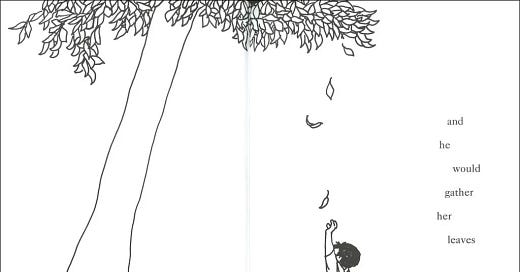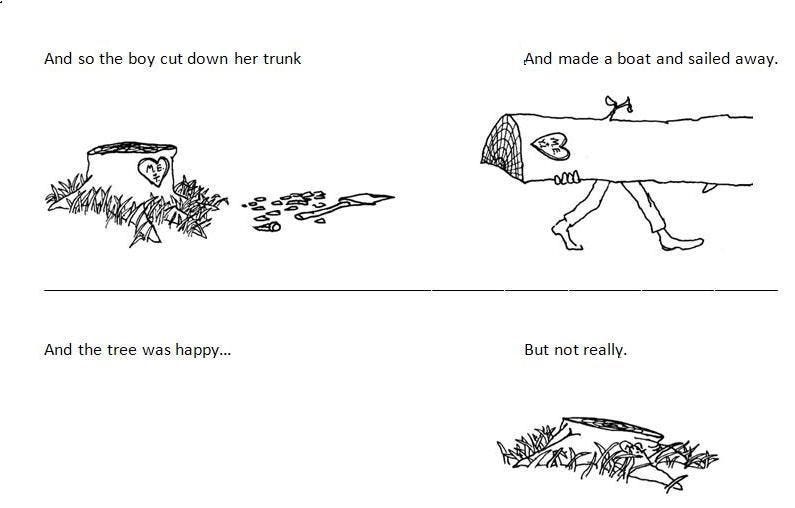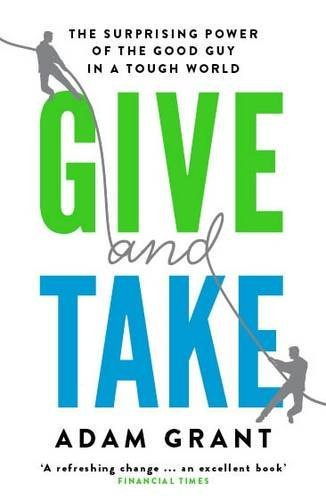Role-modelling healthy boundaries and help-seeking behaviour
How to stop giving at your expense, set boundaries and unashamedly ask for help
Pictured The Giving Tree
The Giving Tree is a children’s storybook about a little boy who exploits a kind tree. The tree loves the little boy so much that she gives away all of her resources to maintain his companionship, until one day she has nothing left. The boy never visits again. The story describes an unhealthy co-dependent relationship.
When I first read the giving tree I recognised myself. I’m the tree. Like many neurodivergent women, I have hyper-affective empathy and compassion - I am a giver. I cannot bear to see someone suffering. I am motivated to help others in need. No matter how much I am personally struggling, I can empathise with others and their pain.
The opposite is true of my family. The men in my life - my father, my brothers, and my ex-partners have difficulties with empathy and exploit others for personal gain. They are takers. They have what is known as ‘Callous unemotional traits’. No empathy. No compassion. No remorse.
This unhealthy pattern of relating has followed me throughout my life.
Excessive empathy, compassion and people-pleasing
I’m not alone, in my recent study of 133 autistic and ADHD women and non-binary, in response to the following statements
”I am highly affected by the distress, pain, or suffering of others.”
(affective empathy)
97.9% endorsed this.
”I am motivated to help those in need and often give at my expense.”
(Compassionate empathy)
92.9% endorsed this.
“I hide my difficulties and struggle to ask for help.”
(Masking difficulties)
91.7% endorsed this.
”I struggle with healthy boundaries and saying no.”
(People pleasing)
94% endorsed this.
Neurodivergent women who are hyper empathetic, compassionate and struggle with healthy boundaries are often targeted for exploitation by people with narcissistic traits. We are more likely to find ourselves in unhealthy relationships with people like the little boy in the Giving Tree, who are unlikely to reciprocate.
Role modelling healthy boundaries
The day the Giving Tree set some boundaries - An alternative ending to the Giving Tree
Positive psychology research shows that people who engage in random acts of kindness experience increased wellbeing, and reduced depression and anxiety. Kindness is contagious. People who receive voluntary help are more likely to reciprocate or pass it on.
Kindness is one of my top strengths. Over the last year, whilst trying to recover from illness, I have been trialling a kindness business model. This trial was designed to widen access to services for those who could not access UK government financial support and reduce social inequity. Today I’m ending the trial.
Trusting the science, I pledged that for every 3 paid coachees self-funded or paid through access to work I would offer 1 unemployed neurodivergent human brief intensive coaching to help them get back on their feet. I am proud to say that I have given over 50K of free coaching to those in need.
At a time when I desperately needed others to help me, I offered help to others. After 2 years off work due to severe illness, unpaid, I have spent the last year volunteering to help other neurodivergent women, unpaid. Meanwhile, I was paying for private hospital treatment to save my life and secretly could not afford to eat.
While the research says that kind people receive more help, and benefactors are more likely to reciprocate, in reality, I found little evidence for this. Over the last year, I have received just 1K in paid coaching. A giving-to-receiving ratio of 50:1. My kindness experiment was unsuccessful.
Picture from the Giving Tree - when the kind tree gives away her final resources leaving her alone and deeply unhappy.
This has done little to improve my mental or financial health. Kindness without boundaries is counterproductive to wellbeing and depletes resources. 3 years ago I was earning over 6 figures coaching and consulting to C-Suite executives. Today, on paper, I am reputedly worth 1% of my former self.
Today I am going to bravely role model how to set healthy boundaries. I am no longer willing to give at my expense. We are not a charity. This business model is unsustainable. I am withdrawing all free services provided by More Human for neurodivergent women.
Balancing excess giving with help-seeking
In positive psychology, we talk about strengths overuse and underuse. When a strength is overused with a negative impact on yourself or others it is no longer considered a strength.
While the autism diagnostic criteria, based on research on boys and men, specifies a persistent pattern of “deficits in social-emotional reciprocity”, neurodivergent women report excessive empathy and reciprocity.
When a person overuses a strength interpersonally this is often at the cost of using this strength intrapersonally. Neurodivergent women are quick to help others in need but struggle to ask for help.
Difficulties with help-seeking behaviour are closely related to a fear of rejection, judgement or abandonment and toxic shame. Shame is a negative emotion caused by the belief that you are somehow unworthy of help, support, connection or belonging or support because there is something innately wrong with you.
Neurodivergent women who were denied a diagnosis and support in childhood, continue to believe they will not be given help. Today I am going to challenge that. You are worthy of help. I am worthy of help. What matters is who you ask for help.
In ‘Give and Take’ Adam Grant advises you to consider whether someone is a ‘giver’, a ‘matcher’, or a ‘taker’ before offering them help. It is unwise to help a ‘taker’ - don’t be like the Giving Tree. Invest your time and energy in helping fellow ‘givers’ and ‘matchers’ you know will reciprocate.
The same rule of thumb guides who you should ask for help. It is fruitless to ask someone who struggles with empathy for help. If you are going to ask for help make sure your audience is empathetic to your situation.
Pictured Give and Take Adam Grant.
Role modelling vulnerability and help-seeking behaviour
Here is how to unashamedly ask others for help. I’d encourage you to self-reflect, after reading this, about how you feel in response to someone vulnerably asking for help?
Hello, I’m Leanne.
I’m a late-diagnosed neurodivergent woman and the founder of More Human. More Human are on a mission to close the gender gap in ADHD and autism recognition and diagnosis, widen access to good support and empower women with knowledge.
Without a diagnosis, ADHD and autistic girls are a high risk of victimisation and abuse, especially sexual abuse, subsequent mental illness, unemployment, homelessness and suicide. I believe these outcomes are preventable.
Over the last 4 months, I have been leading what is now 267 neurodivergent humans through exploratory research and a co-design process to develop a breakthrough service to screen for ADHD and autism amongst adult women. Recent validation testing showed 100% detection rate of ADHD and autism and 5-star reviews.
This project is about turning pain into purpose.
2.5 years ago after 13 years living in NZ, and the end of an abusive relationship, I decided to move back to Scotland and rebuild my life. I packed up my house alone, shipped all of my belongings and got on a plane. Nothing could prepare me for what was next.
I moved back to a rental housing emergency, recession and cost of living crisis. I was exploited by a corporate consultancy and two narcissistic women who callously deceived me leaving me trapped in a traumatic situation.
As a returning citizen, I was excluded from rental housing, employment, healthcare and financial support. I lost tens of thousands in savings trying to weather the storm. I spent 10 months without a permanent home, causing my physical and mental health to collapse.
When I asked my family for help they told me “You need to deal with this alone”. I have been living independently since I was just 15 years old. I am now 37. Every time I go to the hospital for treatment, there is nobody beside my side. My family left me for dead.
I have spent my whole life believing that I am unworthy of help, being the person that others look to for empathy and strength, and a leader to others. For years I covered a lifetime of abuse, neglect and trauma. I’m tired of putting on a brave face.
In 2 weeks, I am scheduled to return to my MAPPCP to complete a peer-reviewed study and validate the screenings to gold standard. If I cannot raise funds I will be forced to withdraw. Whilst this will be devastating, I will walk away from this project proud of my courage and that I was brave enough to ask for help.
I have spent the last year volunteering to help neurodivergent women meanwhile hiding that I have been fighting for my life, suffering beyond what I can put into words, with no relational support.
I would be grateful if you could help me to make a difference for neurodivergent women. Rose and I have arranged a fundraising event to try to make this study possible. Details below.
Thank you for your support.
Leanne.
Funding - we need your help to keep going
We are at a stage to continue R&D we must generate revenue. We need other neurodivergent women to invest in our services and help close the gender gap.
Rose Matthews and I are offering discounted tickets to the first session of flourishing with ADHD or autism - working with your strengths - to raise funding. Please tell a friend.
Join 60 other neurodivergent humans, discover your strengths and difficulties, and learn about positive psychology for £150. Ticket proceeds will go towards conducting my Master's research and ongoing R&D.
5 ways you can support my work and help me deliver this breakthrough service
Restack and reshare this post (it is free)
To support my research and writing, upgrade to become a paid subscriber
Book 1-1 positive psychology coaching with me - see my LinkedIn references. (UK funding is available through Access to Work)
Enrol in flourishing with ADHD or autism - a 10-week group coaching and learning experience for neurodivergent women, non-binary and AFAB. You can read about the programme here. (UK funding is available through Access to Work.)
Support the Kickstarter campaign with presales to help me put more humans on deck.






